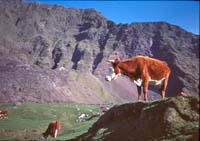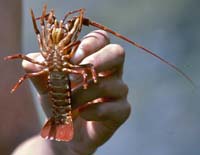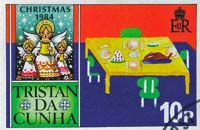A guide to pages on Tristan da Cunha's Economy
- Government - Separate section on Tristan da Cunha's Government Organisation
- Cargo and Fishing Boats - The essential lifeline for Tristan's Economy
- Fishing - A guide to Tristan's most important income
- Farming - An activity that involves every islander
- Sheep and Woollen Industry - Focusing on one part of Tristan's farming and handicraft industry
- Post Office & Museum - Including all Tristan da Cunha's Shops
- Tourism - Separate section providing a guide to Tristan visits
But first we suggest you read this general guide to Tristan's unique economy....
A mixed economy
Tristan da Cunha's economy is based on traditional subsistence farming and fishing to provide islanders with their own food. Valuable foreign earnings come from the royalties from the commercial Crawfishing (or Tristan Rock Lobster) Industry and the sale of postage stamps and coins, especially to philatelists and collectors worldwide. Limited revenue from tourism includes providing accommodation, guides and sales of handicrafts and souvenirs to visitors and by mail order. It is the income from foreign revenue earners that enables Tristan to run Government services, especially health and education. 21st Century income is lower than that of twenty years ago.This website aims to promote Tristan's unique products worldwide for the benefit of the local economy and the welfare of its people.
 |
Images of Tristan's Farming Left: Stock include Cattle Right: Crops include the staple Potato grown in the Potato Patches |
 |
A unique social and economic organisationTristan da Cunha offers the world a special social and economic organisation evolved over the years, but based on the principles set out by William Glass in 1817 when he established a settlement based on equality. All Tristan families are farmers, owning their own stock and tending Potato Patches and settlement gardens around houses built by themselves or by their ancestors. All land is communally owned, and stock numbers are strictly controlled to both conserve pasture and to prevent better off families accumulating wealth. No 'outsiders' are allowed to buy land or settle on Tristan - despite many applications to join a society referred to as 'Utopia'. |
||
 |
Images of Tristan's Exports Left: The crawfish or Tristan Rock Lobster Right: Colourful Postage Stamps - |
 |
Flexible WorkingTristan da Cunha has a model of flexible working which is the envy of many people stuck in a career routine. All people (including children and pensioners) are involved in farming whilst adults additionally have salaried jobs working either for the fishing company and / or the Government or a small number in domestic service. It would not be unusual for a man to have a salaried job working for a Government Department, and also be paid to fish part-time in good weather during the season. He would expect to take days off to build or repair his own house, or to volunteer to help with a neighbour's repair. Family groups would take a few days off in the summer for a Nightingale hunting and gathering trip or a trip to The Caves for a 'holiday', Stony Beach for cattle or Sandy Point for apples. Women are employed in a wide range of Government jobs, also working part-time processing crawfish in the factory on fishing days or in domestic service. Whilst many jobs which appear by tradition to be exclusively male or female, several Heads of Department are women, and the island has a tradition of women in leading roles, including at various times the Chief Islander and the Head of St Mary's School. |
||
